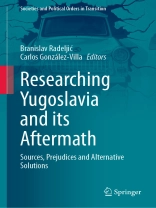In
Researching Yugoslavia and its Aftermath, a common thread is the authors’ path through the time and space context in which fieldwork has taken place. Accordingly, this collection tackles problems that have always existed but have not been dealt with in a single volume. In particular, it examines a range of methodological questions arising from the contributors’ shared concerns, and thus the obstacles and solutions characterising the relationship between researchers and their objects of study. Being an interdisciplinary project, this book brings together highly regarded historians, sociologists, anthropologists, political scientists, cultural and social theorists, as well as experts in architecture and communication studies. They share a belief that the awareness of the researcher’s own position in fieldwork is a precondition of utmost significance to comprehend the evolution of objects of study, and hence to ensure transparency and ultimate credibility of the findings. Moreover, the contributors come from diverse backgrounds, including authors from the former Yugoslavia and others who have made their way to the region after starting their research careers; some from universities in the area, others from institutions in the Global North. Here, they explore cross-cutting issues such as the repercussions of gender, nationality, institutional affiliation and the consequences of their entry into the field. This is examined in terms of the results of the research and the ethical aspect of the relationship with the object of study, as well as the implications of the chosen time framework in the methodological design and the clash between this decision and the interests of the actors studied.
Table of Content
1. Post-socialist ‘discovery’ of Yugoslavia: Intrinsic and extrinsic obstacles to studying an atypical phenomenon.- 2. The benefits of frame analysis to understanding Yugoslavia and beyond.- 3. Digging for the truth: Archival bias in Yugoslavia.- 4. Stranci: Political research and language learning in Yugoslavia.- 5. Native ethnography in Yugoslavia: The role of home, migration and republike.- 6. Multiplicity, nuance and contradiction: Knowledge production.- 7. What happened in the Goli otok labour camp?- 8. Researching ‘the lost decade’ of New Belgrade.- 9. Oral accounts of Slovenia’s sovereignty process: Representations and justifications after independence.- 10. Defying dogma: Encounters with rigid models of fluidity in Bosnia and Herzegovina.
About the author
Branislav Radeljić is Professor of International Relations at Necmettin Erbakan University, Konya, and Visiting Professor of European Politics at Antonio de Nebrija University, Madrid. He is the author and editor of numerous publications dealing with European Union, East European and Western Balkan political and socioeconomic developments.
Carlos González-Villa is Assistant Professor of Political Science and International Relations at the University of Castilla-La Mancha, Toledo, and Non-Resident Fellow at the Center for Advanced Studies of Southeastern Europe at the University of Rijeka. His main research interests focus on the post-Yugoslav space and US foreign policy. He has held visiting fellowships at Johns Hopkins University and the University of Ljubljana.












